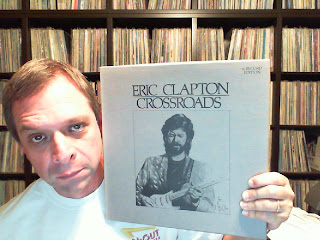With an album title like
Disco-Trek, you might figure it's William Shatner singing "I Will Survive", or something. Truth is, this album from 1976 is more about Philly soul than disco.I first learned about this album from Richard Christgau, who wrote music reviews for the Village Voice throughout the '70s and '80s. He was not effusive, but then Christgau was never known as much of a soul fan, so it figures.
Here's the story: flash back to 1975, and disco is just taking off in the East Coast clubs. Record companies are scrambling to ride the wave, and the big guys at Atlantic asked themselves "what have we got in the vaults already that could be considered 'disco'?" The answer was: not much. But they forged ahead anyhow, and liberated a set of undeservedly underexposed tracks from the vaults, gave the multis to Tom Moulton, a recording engineer who'd made a name for himself by taking tracks others had made and mixing them over again. Yes, Tom Moulton was the guy who
invented the Remix. Although unlike today's remix DJs, Moulton's trick was to remove elements from the mix and insert the stripped-down instrumental results into the original mix of the record. He was 35 when this record was made, and he was already the king of the New York club mix scene - and a white guy, too.
The tracks that Atlantic gave Moulton to work his magic on were not ones that were well-known. And for us, that's fortunate, since the soul gems contained here are pretty special in their own right; hearing them remixed and extended is a true joy. Being a Philly boy himself, he did the work at Philadelphia's Sigma Sound Studios, run by Kenny Gamble and Leon Huff, the owners of Philadelphia International Records.
 |
| Clyde Brown. Killer song... |
There are some standout songs here. The first one that kicks your butt is "You Call Me Back" by Clyde Brown, a soul man who'd cut a few tracks with Thom Bell, he of Delfonics, Spinners and Stylistics fame. Along with Gamble and Huff, Bell was the foremost proponent of the Philly sound, and he was at the top of his game when Brown cut this track: it sounds like a lost Spinners side. Moulton's extended mix plays up the Philly groove to the max, with emphasis on the big orchestral setting and tight horn charts so prevalent in Bell's work. (Brown waxed a few more sides for Atlantic, but never hit solo, although he became part of the reconstituted Drifters during their '70s European revival. He's still gigging around Cincy and Cleveland.)
Next there's a remix of one of Blue Magic's lesser-known tracks, "Look Me Up." I'm convinced that this song was not a hit simply because Blue Magic had become typecast as a ballad band, but this is an uptempo cut that cooks from the get go, produced by Norman Harris of WMOT fame.
There's an early Sister Sledge single that never made it to an album. "Mama Never Told Me" is pure soul bubblegum, but it's an early Anthony Bell song; Bell went on to write hits for artists as diverse as Jill Scott, Vivian Green, Teddy Pendergrass and the O'Jays.
Then there's Jackie Moore's "Time" and The Sweet Inspirations' "This World", both stomping Gospel-rooted shouters, and "Got To Get You Back", a strident workout from Philadelphia cult-soul artists Sons of Robin Stone (who are rumored to be reuniting soon).
Finally, the payoff comes in the form of two insanely rare Atlantic cuts: the first from the Valentinos,
nom du disc of the Womack Brothers, and the song, "I Can Understand It" is written by Bobby Womack, so you know it's first class. There's no figuring why this didn't climb the charts. The second gold strike is the United 8's "Getting Uptown (To Get Down), an instrumental actually recorded in 1972 but so close to the disco concept that it's included here; copies of the 45 go for insane prices today (when you can find them).
All in all, this is a great disc for students of Philly soul. The axis of Thom Bell, Tom Moulton and Sigma Sound made for an unbeatable combination, and repeated listenings always pay you back. In fact, I've owned this album for nearly 20 years, and just pulled it out to burn a CD from... it's that good.
Links for further investigation:
Tom Moulton Tribute Page
Thom Bell page at the Songwriters Hall of Fame
United 8 on YouTube
Clyde Brown on YouTube
































